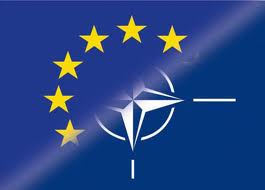News

Benefits of membership of Macedonia in EU and NATO
Date: 25.09.2018
EU and NATO membership presents a new perspective for the Macedonian economy. Macedonia first applied for EU membership on March 22, 2004 and on December 17, 2005, the Presidency of the European Council in Brussels granted Macedonia candidate status for European Union membership. Resolving the name issue is a condition for joining the union. On June 17 this year, Foreign Ministers Nikola Dimitrov and Nikos Kodzias signed the Prespa Accords on the name dispute in Prespa, thus overcoming the decades-long dispute over the name being a condition for EU and NATO accession. On June 26 this year, the EU Council of Ministers set a provisional date for the start of negotiations with Macedonia. Also, on July 11 this year, at a summit in Brussels, Macedonia was officially invited to start NATO membership negotiations. The next stage in the accession process is getting a date for EU membership negotiations. The process of accession negotiations with the European Union for the Republic of Macedonia will mean ending the process of approximation to the Union, adopting its benefits and values.
EU activities cover all areas of public policy, from health and economic policy to foreign policy and defense. Being part of the Alliance and the European family is a multiple benefit. The biggest benefit of Macedonia's accession to the EU and NATO will be reflected in the gradual release of party clerks, both citizens and institutions. Membership in NATO and the EU will enable new investments that will create new jobs, thereby halting the eviction trend. With EU membership, young people from Macedonia will have easier access to scholarships and scholarships, internship opportunities, training and specializations in EU countries. It will also provide stability, security and prosperity with more investment and more money in the economy. That means more money in the economy, new better paid jobs and a higher standard of living for all citizens. EU membership has access to a market of 500 million people, new investments are creating jobs, followed by investments in new know-how and technology, and education reforms will contribute to increasing the competitiveness of the domestic economy. access to European education, European health for all citizens of the Republic of Macedonia.
This has been confirmed by the examples of all countries that have been integrated into the EU and NATO in recent years. NATO integration has a positive impact on infrastructure development. New roads, railways, communication and energy systems will be built. In addition, NATO membership will have a positive impact on other sectors such as the information and telecommunications industry, tourism and education. EU and NATO member states show greater progress in terms of institutional credibility, government effectiveness, rule of law, freedom of expression and control of corruption. Most importantly, with Macedonia's accession to the EU and NATO, Macedonian identity is guaranteed.
The Center for Change Management (CUP) singled out the following benefits as most significant for the Republic of Macedonia in the process of joining the EU and NATO:
NATO and EU membership means strengthening the geostrategic positions of the Republic of Macedonia. As an equal member of NATO and the EU, we will have the opportunity to influence and equal decision-making in these organizations.
NATO membership enhances the security and stability of the country thus creating a better basis for economic growth and development, long-term security and political stability.
membership in NATO and the EU will contribute to greater democratization, better governance and increased reform momentum.
EU membership means entering one of the world's largest and most developed markets, boosting prospects for economic growth.
NATO and EU membership contributes to better and faster progress in structural reforms to improve the business climate and the development of the private sector.
membership in NATO and the EU also leads to an increase in total investment in the country.
NATO and EU membership have been followed by a trend of job creation and unemployment reduction.
EU membership is also an incentive to increase competitiveness and exports.
EU and NATO membership means a higher standard of living and a better quality of life for citizens.
membership in NATO and the EU will also increase financial assistance from abroad and from European and international financial institutions.








